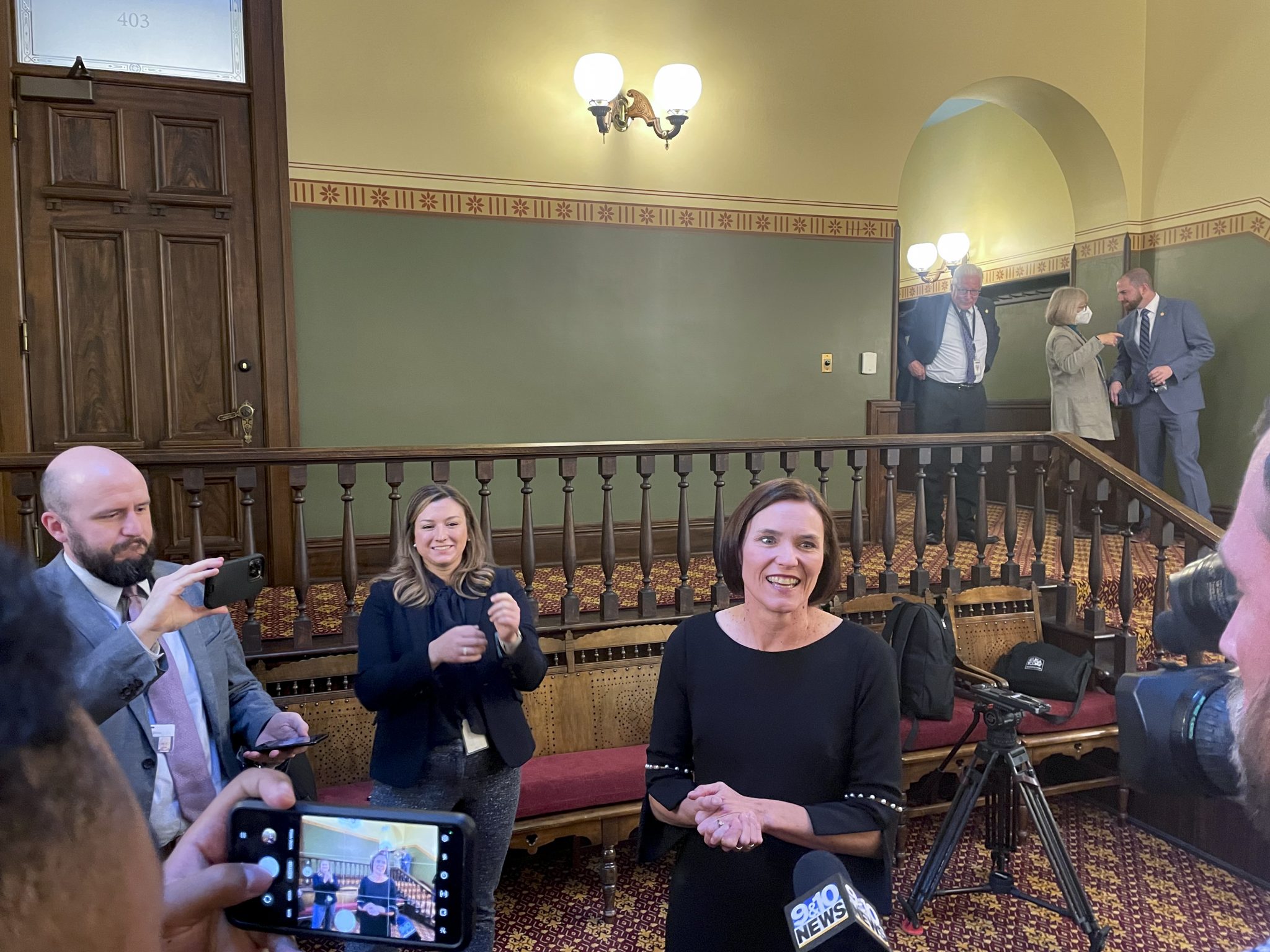MichMash: The road ahead with incoming Senate Majority Leader Winnie Brinks
Incoming Senate Majority Leader Winnie Brinks joins Cheyna Roth to discuss how the Senate plans to rule with a slim majority.

Michigan state Sen. Winnie Brinks stands before reporters in the state Capitol in Lansing, Mich., on Thursday, Nov. 10, 2022, minutes after Senate Democrats voted to make her the chamber’s first female leader.
Michigan Democrats will take control of the state House and Senate next year and Governor Whitmer will return for a second term. Incoming Senate Majority Leader Winnie Brinks joins Cheyna Roth to discuss how the Senate will work with the House and Governor’s office, ruling with a slim majority and Senator Brinks’ path to becoming the first female Senate Majority Leader in Michigan history.
Subscribe to MichMash on Apple Podcasts, Spotify, NPR.org or wherever you get your podcasts.
In this episode:
- Senator Winnie Brinks talks with host Cheyna Roth, giving a glimpse of what to expect when the legislature starts its next session in January.
- Democrats hold control of the State Senate, House of Representatives and Governors Office.
- Majority control of the state government may make passing their agenda easier for democrats but they’re also seeking to work across the aisle.
Senator Winnie Brinks, and soon to be the first female Senate Majority Leader, had an interesting path to politics. Brinks won her first primary as a write-in democratic candidate for the State House. She was elected to the State Senate in 2018 and was reelected this year despite redistricting.
“I feel like as somebody who is not intending to go into politics, I came in with fresh eyes for some of the dynamics,” Brinks said. “And I think that really does inform how I govern and how I do my job. It’s been a lot of work. It’s been a frustrating decade. And I think that that determination, and that consistency, and the work ethic has really been the thing that has helped me get through it.”
Democrats have control of the State Senate, House of Representatives and Governor’s Office. This allows them to control the legislative agenda and decide which bills will be voted on.
“So while I’m hopeful that the legislators themselves on the other side of the aisle will be respectful and productive when they do this, regardless of how they present themselves, the people that they represent matter to what we do in the legislature,” Brinks said. “So we will do everything we can to pass good policy, whether they agree with it or not, for the people in their districts. Sometimes these districts are fifty-fifty and so if you get someone who’s a hardcore partisan, that leaves about 50% of their constituency that is without a voice. That has happened around Kent County for decades.”
Brinks and other legislators are still having conversations about what policies are their priorities before the 2023 class of legislatures are sworn in. With a slim majority in Michigan’s Senate, they’re also trying to build relations across the aisle, Brinks said.
“We also know that there are Republicans out there who really would like to see us do better in our state and have been squashed in their own caucus and party. So we’re hopeful to find those folks and establish relationships with them as well,” Brinks said.
Policy that democrats will be addressing are things Governor Gretchen Whitmer has been talking about for years, Brinks said. These include continuing to support educators and young people in K-12 and in through secondary education, addressing equality in Michigan, LGBTQ rights, and reproductive freedom and additional bills to strengthen Prop 3.
With democrats in the majority, Brinks said she understands there will be times when republicans disagree. She hopes both parties can have a “respectful relationship” that will enable bipartisan agreements.
“So there will be times when they are frustrated, but I’m hopeful that we will commit to fair play on our part. As you know, we’ve seen them abuse their power and shut down legitimate discourse and disadvantage our ability to make our points that are of concern to 50% of the people in Michigan,” Brinks said. “So while I’m hopeful that the legislators themselves on the other side of the aisle will be respectful and productive when they do this, regardless of how they present themselves, the people that they represent matter to what we do in the legislature.
There’s not a lot expected in Michigan’s lame duck congress, but Gov. Whitmer is in conversation with republican leaders to see what can be passed to make a difference for Michiganders.
Related posts:
- MichMash: Unpacking Michigan’s historic 2022 midterm election
- Detroit Evening Report: Detroit voter turnout surpasses estimates, still lower than 2018 elections
- President Biden visiting Michigan today to tout legislative, midterm elections success
Trusted, accurate, up-to-date.
WDET strives to make our journalism accessible to everyone. As a public media institution, we maintain our journalistic integrity through independent support from readers like you. If you value WDET as your source of news, music and conversation, please make a gift today.

